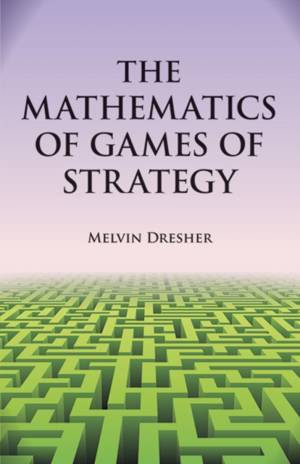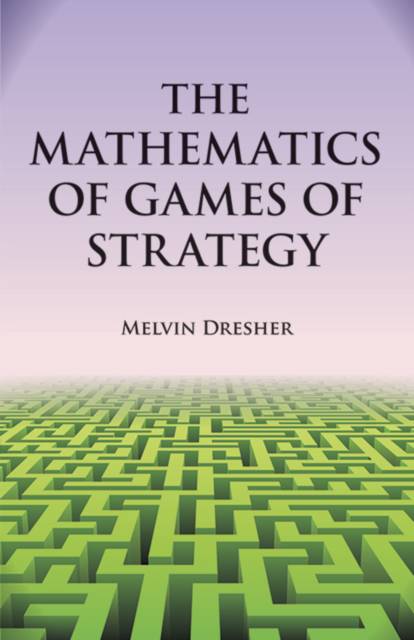
- Retrait gratuit dans votre magasin Club
- 7.000.000 titres dans notre catalogue
- Payer en toute sécurité
- Toujours un magasin près de chez vous
- Retrait gratuit dans votre magasin Club
- 7.000.000 titres dans notre catalogue
- Payer en toute sécurité
- Toujours un magasin près de chez vous
Description
Melvin Dresher, noted research mathematician for the Rand Corporation, puts forth an exceptionally clear presentation of the mathematical theory of games of strategy and its applications to many fields including: economics, military, business, and operations research. The mathematical presentation is elementary in the sense that no advanced algebra or non-elementary calculus occurs in most of the mathematical proofs.
The author presents game theory as a branch of applied mathematics. In addition to developing a mathematical theory for solving games, he shows how to formulate a game model associated with a given competitive or conflicting situation. Furthermore, he shows how some decision problems, such as timing of decisions, which do not resemble game situations, can be analyzed as a game, yielding rich insights into the decision problems.
Beginning with an exposition of games of strategy, with examples from parlor games as well as military games, Dr. Dresher proceeds to treat the basic topics in the theory of finite games, i.e., the existence of optimal strategies and their properties. An elementary proof of the minimax theorem is given that provides an efficient method for computing optimal strategies.
Since many games involve an infinite number of strategies, succeeding chapters deal with such games by first developing the necessary mathematics (e.g., probability distribution functions and Stieltjes integrals) for analyzing infinite games. The results of infinite games are then applied to two general classes of games -- timing games and tactical games. A final chapter provides an application of moment space theory to the solution of infinite games.
This is a book about decision making in the absence of perfect information. In particular, it analyzes decision problems in a competitive environment where conflicting interests exist, and uncertainties and risk are involved. For the reader who is interested in the applications of the theory of games of strategy to military, economic, or political problems, or to decision making in business, operations research, or the behavior sciences, it will prove a most rewarding study.
The author presents game theory as a branch of applied mathematics. In addition to developing a mathematical theory for solving games, he shows how to formulate a game model associated with a given competitive or conflicting situation. Furthermore, he shows how some decision problems, such as timing of decisions, which do not resemble game situations, can be analyzed as a game, yielding rich insights into the decision problems.
Beginning with an exposition of games of strategy, with examples from parlor games as well as military games, Dr. Dresher proceeds to treat the basic topics in the theory of finite games, i.e., the existence of optimal strategies and their properties. An elementary proof of the minimax theorem is given that provides an efficient method for computing optimal strategies.
Since many games involve an infinite number of strategies, succeeding chapters deal with such games by first developing the necessary mathematics (e.g., probability distribution functions and Stieltjes integrals) for analyzing infinite games. The results of infinite games are then applied to two general classes of games -- timing games and tactical games. A final chapter provides an application of moment space theory to the solution of infinite games.
This is a book about decision making in the absence of perfect information. In particular, it analyzes decision problems in a competitive environment where conflicting interests exist, and uncertainties and risk are involved. For the reader who is interested in the applications of the theory of games of strategy to military, economic, or political problems, or to decision making in business, operations research, or the behavior sciences, it will prove a most rewarding study.
Spécifications
Parties prenantes
- Auteur(s) :
- Editeur:
Contenu
- Nombre de pages :
- 208
- Langue:
- Anglais
- Collection :
Caractéristiques
- EAN:
- 9780486642161
- Date de parution :
- 01-12-81
- Format:
- Livre broché
- Format numérique:
- Trade paperback (VS)
- Dimensions :
- 138 mm x 215 mm
- Poids :
- 217 g







